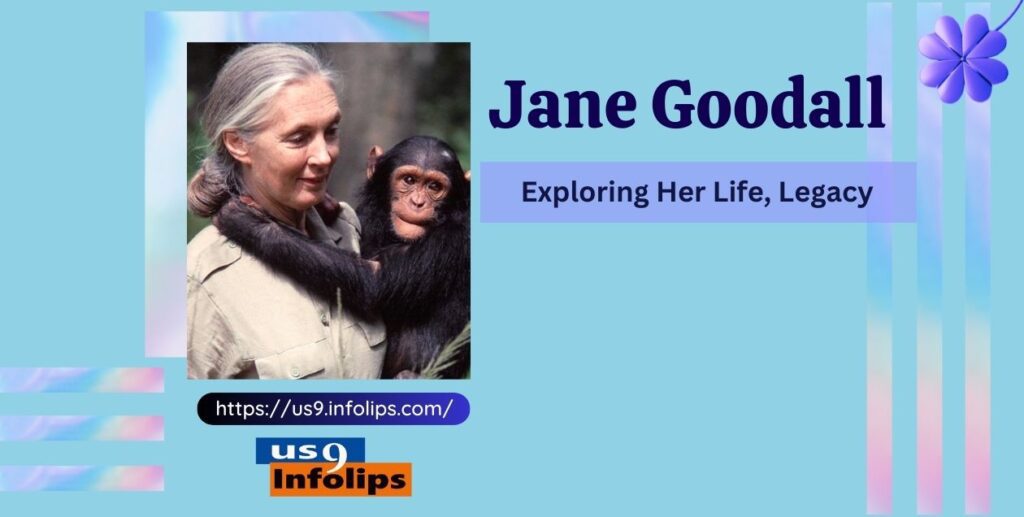A Short and Detailed Biography of Jane Goodall : Exploring Her Life
Biography of Jane Goodall : Exploring Her Life, Legacy
Introduction to Jane Goodall
Jane Goodall is a renowned British primatologist, ethologist, and anthropologist, best known for her groundbreaking research on chimpanzees in Tanzania. Born on April 3, 1934, in London, England, she has dedicated her life to studying and advocating for the protection of chimpanzees and their habitats.
Table of Contents
Early Life and Education
Growing up, Jane’s love for animals was evident. She spent much of her childhood exploring nature and dreaming of living among wild animals in Africa.
Despite facing financial constraints, she pursued her passion for animals and earned a degree in Ethology from the University of Cambridge.
Passion for Animals and Africa
In 1957, Jane Goodall fulfilled her childhood dream when she traveled to Kenya and met renowned paleontologist Louis Leakey. Impressed by her enthusiasm and knowledge, Leakey hired her to assist him in his research.
This opportunity marked the beginning of her extraordinary journey into the world of primatology.
Groundbreaking Research on Chimpanzees
In 1960, Jane embarked on her pioneering research in what is now Tanzania’s Gombe Stream National Park. She observed chimpanzees in their natural habitat, documenting their behavior and social interactions.
Her observations challenged the scientific community’s understanding of chimpanzees and redefined the relationship between humans and animals.
Contributions to Primatology
Jane Goodall’s research revolutionized the field of primatology, providing valuable insights into chimpanzee behavior, communication, and social structure.
Her discoveries, including tool use among chimpanzees, demonstrated the remarkable cognitive abilities of our closest living relatives and blurred the line between humans and animals.
Environmental Activism and Conservation Efforts
Beyond her scientific contributions, Jane Goodall is a passionate advocate for environmental conservation and animal welfare. She founded the Jane Goodall Institute in 1977, dedicated to wildlife research, conservation, and community development.
Through her Roots & Shoots program, she inspires young people worldwide to take action for a sustainable future.
Honors and Recognition
Throughout her career, Jane Goodall has received numerous honors and awards for her tireless dedication to conservation and humanitarian efforts.
She has been honored with prestigious awards such as the Kyoto Prize, the Tyler Prize for Environmental Achievement, and the Order of the British Empire.
Legacy and Impact
Jane Goodall’s legacy extends far beyond her scientific achievements. She has inspired countless individuals to pursue careers in conservation and advocacy, leaving a lasting impact on future generations.
Her holistic approach to wildlife conservation emphasizes the interconnectedness of all living beings and the importance of protecting our planet’s biodiversity.
9 Interesting Facts About Jane Goodall:
- Early Fascination with Animals:
From a young age, Jane Goodall showed a keen interest in animals. She spent hours observing and interacting with wildlife near her childhood home in England, fostering a deep connection with the natural world. - Pioneering Research Methods:
Unlike traditional scientists of her time, Jane Goodall utilized innovative research methods in her study of chimpanzees.
She introduced the practice of giving names to individual chimpanzees instead of assigning them numbers, fostering a more personal connection with her subjects. - Discovery of Tool Use:
One of Jane Goodall’s most groundbreaking discoveries was observing chimpanzees using tools. In 1960, she witnessed a chimpanzee named David fashioning a twig into a tool to extract termites from their mound—a behavior previously believed to be exclusive to humans. - First to Observe Chimpanzee Warfare:
During her research, Jane Goodall documented instances of aggression and warfare among chimpanzee communities. Her observations challenged the notion of primates as peaceful creatures and shed light on the complexities of chimpanzee social dynamics. - Environmental Activism:
Beyond her scientific endeavors, Jane Goodall is a passionate advocate for environmental conservation. She travels extensively, speaking out on issues such as habitat destruction, animal welfare, and climate change, inspiring individuals and communities to take action. - Establishment of the Jane Goodall Institute:
In 1977, Jane Goodall founded the Jane Goodall Institute, dedicated to wildlife research, conservation, and community development. The institute continues to be a driving force in environmental activism and primate conservation worldwide. - Roots & Shoots Program:
Jane Goodall’s Roots & Shoots program empowers young people to become environmental leaders in their communities. The program encourages youth to identify local environmental challenges and develop sustainable solutions, fostering a sense of responsibility and activism. - Honors and Awards:
Throughout her career, Jane Goodall has received numerous accolades for her contributions to science and conservation. These include the Kyoto Prize, the Hubbard Medal, and the UNESCO-MAB Biosphere Award, among many others. - Legacy of Inspiration:
Jane Goodall’s legacy extends far beyond her scientific achievements. She has inspired generations of individuals to pursue careers in conservation, primatology, and environmental advocacy, leaving an indelible mark on the world and shaping the future of conservation efforts.
9 Lesser-Known Facts About Jane Goodall:
- Musical Talent:
While Jane Goodall is renowned for her work in primatology, she also has a lesser-known talent for playing the piano. Music has been a lifelong passion for her, providing a creative outlet alongside her scientific pursuits. - Love for Writing:
In addition to her scientific publications, Jane Goodall is an accomplished writer. She has authored numerous books for both adults and children, sharing her experiences and insights into the natural world with a wide audience. - Connection with Indigenous Cultures:
Throughout her career, Jane Goodall has cultivated relationships with indigenous communities around the world. She recognizes the importance of indigenous knowledge and perspectives in conservation efforts, collaborating with local tribes to protect biodiversity and traditional lands. - Advocate for Animal Welfare:
Beyond her research on chimpanzees, Jane Goodall is a vocal advocate for animal welfare. She has campaigned against unethical practices such as animal testing and the exotic pet trade, working to improve the treatment of animals worldwide. - Passion for Botany:
While studying chimpanzees in Tanzania, Jane Goodall developed a deep appreciation for the region’s flora. She has since become an amateur botanist, studying and documenting the diverse plant species found in the habitats she frequents. - Humble Beginnings:
Despite her global fame, Jane Goodall remains humble and down-to-earth. She often recounts her early struggles as a young researcher, including living in primitive conditions in Gombe National Park without modern amenities. - Spiritual Connection with Nature:
Jane Goodall has described her profound spiritual connection with nature, viewing the natural world as a source of wonder, inspiration, and interconnectedness. She believes in the importance of fostering a deeper appreciation for the environment to promote conservation efforts. - Advocate for Girls’ Education:
Recognizing the transformative power of education, Jane Goodall is a strong advocate for girls’ education in developing countries. Through her work with various organizations, she supports initiatives that empower girls and women through access to education and opportunities. - Continued Fieldwork:
Despite her advancing age, Jane Goodall remains actively involved in fieldwork and research. She continues to visit chimpanzee habitats, observe their behavior, and advocate for their protection, demonstrating a lifelong commitment to conservation and scientific inquiry.
9 Controversies Associated with Jane Goodall:
- Ethical Concerns in Early Research:
Some critics have raised ethical concerns about Jane Goodall’s early research methods. During her pioneering study of chimpanzees in the 1960s, she habituated the animals to human presence and provided them with food incentives, leading to accusations of habituation bias and potential disruption of natural behaviors. - Criticism of Anthropomorphism:
Throughout her career, Jane Goodall has been criticized for anthropomorphizing chimpanzee behavior—attributing human-like emotions and intentions to non-human animals.
While her empathetic approach has helped humanize chimpanzees in the public eye, some scientists argue that it may lead to misinterpretations of their behavior. - Controversy over Captive Chimpanzee Research:
Jane Goodall has faced criticism for her involvement in research projects involving captive chimpanzees. Some animal rights activists argue that such research perpetuates the exploitation of chimpanzees for human gain, raising ethical concerns about the treatment and welfare of captive primates. - Opposition to Certain Conservation Practices:
Despite her advocacy for conservation, Jane Goodall has faced opposition from some environmental groups and indigenous communities over her support for certain conservation practices.
For example, her endorsement of ecotourism initiatives in chimpanzee habitats has been criticized for its potential negative impact on local ecosystems and cultures. - Conflicts with Traditional Scientific Methods:
Jane Goodall’s unconventional approach to studying chimpanzees, which emphasizes long-term observation and individual recognition, has sometimes clashed with traditional scientific methods.
Critics argue that her qualitative, observational approach lacks the rigor and objectivity of quantitative research methods, leading to debates within the scientific community. - Involvement in Political Controversies:
Jane Goodall’s outspokenness on environmental and social issues has occasionally drawn her into political controversies. Her criticism of government policies related to wildlife conservation and environmental protection has led to tensions with political authorities and industry stakeholders. - Commercialization of Conservation:
Some critics have accused Jane Goodall of commercializing conservation efforts for personal gain. Her endorsement deals with corporate sponsors and commercial partnerships have raised questions about potential conflicts of interest and the commodification of environmental activism. - Allegations of Mismanagement in Nonprofit Organizations:
The management and financial practices of nonprofit organizations associated with Jane Goodall, such as the Jane Goodall Institute, have come under scrutiny. Allegations of mismanagement, including excessive executive salaries and insufficient allocation of funds to conservation programs, have raised concerns among donors and supporters. - Debate over Animal Rights vs. Welfare:
Jane Goodall’s advocacy for animal welfare, which prioritizes the well-being and ethical treatment of individual animals, has sparked debate within the animal rights community.
Some activists argue that her focus on improving the lives of captive animals overlooks broader systemic issues related to animal exploitation and liberation.
FAQs:
- Q: When was Jane Goodall born?
- A: Jane Goodall was born on April 3, 1934.
- A: Jane Goodall was born on April 3, 1934.
- Q: Where is Jane Goodall from?
- A: Jane Goodall is from London, England.
- A: Jane Goodall is from London, England.
- Q: What is Jane Goodall famous for?
- A: Jane Goodall is famous for her groundbreaking research on chimpanzees in Tanzania.
- A: Jane Goodall is famous for her groundbreaking research on chimpanzees in Tanzania.
- Q: What did Jane Goodall discover about chimpanzees?
- A: Jane Goodall discovered that chimpanzees use tools, have complex social structures, and share many behaviors with humans.
- A: Jane Goodall discovered that chimpanzees use tools, have complex social structures, and share many behaviors with humans.
- Q: What is the Jane Goodall Institute?
- A: The Jane Goodall Institute is a nonprofit organization dedicated to wildlife research, conservation, and community development.
- A: The Jane Goodall Institute is a nonprofit organization dedicated to wildlife research, conservation, and community development.
- Q: How did Jane Goodall change the way we view animals?
- A: Jane Goodall’s research helped humanize animals by demonstrating their intelligence, emotions, and social bonds.
- A: Jane Goodall’s research helped humanize animals by demonstrating their intelligence, emotions, and social bonds.
- Q: What awards has Jane Goodall received?
- A: Jane Goodall has received numerous awards, including the Kyoto Prize, the Hubbard Medal, and the UNESCO-MAB Biosphere Award.
- A: Jane Goodall has received numerous awards, including the Kyoto Prize, the Hubbard Medal, and the UNESCO-MAB Biosphere Award.
- Q: Does Jane Goodall still work with chimpanzees?
- A: Yes, Jane Goodall continues to be involved in chimpanzee conservation and research efforts.
- A: Yes, Jane Goodall continues to be involved in chimpanzee conservation and research efforts.
- Q: How can I support Jane Goodall’s work?
- A: You can support Jane Goodall’s work by donating to the Jane Goodall Institute, participating in conservation initiatives, and spreading awareness about environmental issues.
Conclusion
In summary, Jane Goodall’s life and work exemplify the power of passion, perseverance, and compassion. Her groundbreaking research on chimpanzees has reshaped our understanding of the natural world and inspired global efforts to protect endangered species and their habitats. Through her unwavering commitment to conservation and activism, she continues to be a beacon of hope for environmental sustainability and animal welfare.
Follow us for more captivating articles and stay connected to explore the world. Let’s embrace the power of communication and understanding.

Related topics:
1. Perfect World Travel Guide
2. 9 Most Popular EV Cars in the USA
3. 9 Best Things About Apple TV 4K – Third Generation
4. Think before You Renew Amazon Prime
5. Jimmy Carter: A Great Legacy
6. Memorial Day: Honoring the Sacrifice, Celebrating Freedom
School Site :
For English grammar and lot more : Smart School Infolips
Marathi Poems: Marathi Rang












